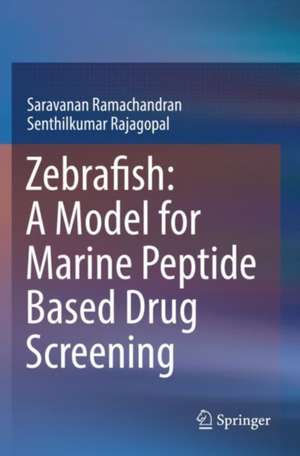Zebrafish: A Model for Marine Peptide Based Drug Screening
Autor Saravanan Ramachandran, Senthilkumar Rajagopalen Limba Engleză Paperback – 15 aug 2020
| Toate formatele și edițiile | Preț | Express |
|---|---|---|
| Paperback (1) | 643.63 lei 38-45 zile | |
| Springer Nature Singapore – 15 aug 2020 | 643.63 lei 38-45 zile | |
| Hardback (1) | 654.98 lei 38-45 zile | |
| Springer Nature Singapore – 4 iul 2019 | 654.98 lei 38-45 zile |
Preț: 643.63 lei
Preț vechi: 677.50 lei
-5% Nou
Puncte Express: 965
Preț estimativ în valută:
123.18€ • 127.62$ • 102.80£
123.18€ • 127.62$ • 102.80£
Carte tipărită la comandă
Livrare economică 17-24 martie
Preluare comenzi: 021 569.72.76
Specificații
ISBN-13: 9789811378461
ISBN-10: 9811378460
Pagini: 73
Ilustrații: XI, 73 p. 39 illus., 29 illus. in color.
Dimensiuni: 155 x 235 mm
Ediția:1st ed. 2019
Editura: Springer Nature Singapore
Colecția Springer
Locul publicării:Singapore, Singapore
ISBN-10: 9811378460
Pagini: 73
Ilustrații: XI, 73 p. 39 illus., 29 illus. in color.
Dimensiuni: 155 x 235 mm
Ediția:1st ed. 2019
Editura: Springer Nature Singapore
Colecția Springer
Locul publicării:Singapore, Singapore
Cuprins
Chapter 1. Biomedical importance of marine peptides/toxins.- Chapter 2. Toxicity of peptides in Zebrafish embryos.- Chapter 3. Teratogenic activity of toxins in Zebrafish model.- Chapter 4. Anticancer properties marine peptides/toxins using Zebrafish model.- Chapter 5. Protective effect of marine peptides/toxins in CVD using Zebrafish model.
Notă biografică
Dr. Saravanan Ramachandran is an Assistant Professor of Marine Pharmacology at the Faculty of Allied Health Sciences, Chettinad University Chennai, India. He completed his PhD in Marine Biotechnology at Annamalai University, India. His research interests focus on drugs from marine organisms. He has received two research awards from the Indian Council of Medical Research and the Centre for Marine Living Resources and Ecology, Kochi, India, and he has published 40 research articles in international/national journals. He is a member of Society for Biotechnologists (India), International Neurotoxin Association, holds 2 patents and 1 copyright and has submitted 15 gene sequences to the NCBI. Currently, he is serving as the principal investigator of a research project funded by the Govterment of India Department of Biotechnology.
Dr. Senthilkumar Rajagopal is an Assistant Professor at the Department of Biochemistry, School of Life Sciences at Rayalaseema University, Kurnool, India. He completed his PhD in Biochemistry at Annamalai University, India, and his postdoctoral fellowship at various Universities in the USA, including the University of Virginia, Harvard and Virginia Commonwealth University. Dr. Rajagopal is a recipient of the Rameshwardasji Birla Smarak Kosh Endowment award from Mumbai Medical Trust, and the Ramalingaswami Re-entry Fellowship from the Department of Biotechnology, Ministry of Science and Technology, Government of India. His research has addressed protein kinase C modulation of calcium channels currents, and was the principal investigator of a major project entitled “G-protein coupled receptor mediated intracellular mechanisms by alcohol-induced digestive disorders in the gastrointestinal tract”. Other interests include G-protein coupled receptor signaling pathways in smooth muscle physiology and neurotransmitters transporters to central nervous system. Dr. Rajagopal is a life member of a numberof respected scientific associations, such as the Indian Society for Atherosclerosis Research (ISAR), The Indian Science Congress Association (ISCA), Society for Free Radical Research India (SFRR), The Indian Society of Cell Biology (ISCB), the American Association of Pharmaceutical Scientists (AAPS) and the Science Advisory Board (SAB), USA.
Textul de pe ultima copertă
This book offers a comprehensive overview of toxicology, highlighting the significance of peptide-based toxins from marine environments. It discusses the principles of protein-carbohydrate and domain-domain interactions to increase our understanding of toxicology in zebrafish models, as well as drug interaction mechanisms and target definition in drug discovery. It also reviews the structure of marine peptides/toxins and the toxicology of peptide secreting cells and cells that respond to these enzymes, and describes the normal and abnormal toxicology of marine peptides in zebrafish models. Offering insights into the field of proteomics, particularly current practice and research models for solving its many riddles, the book also explains the analytical principles of marine protein-protein and protein-carbohydrate interaction in the context of teratogenicity in target identification in peptide- based drug discovery. Lastly, the book methodically examines the preclinical research on marine proteins/peptides.
Caracteristici
Presents the cutting-edge use of zebrafish as a model organism for screening the efficacy of various marine peptides/toxins Discusses the potential of various marine peptides/toxins as anti-cancer and cardioprotective agents Evaluates the teratogenic activity of marine peptides on zebrafish embryos Offers up-to-date information on marine pharmacognosy
